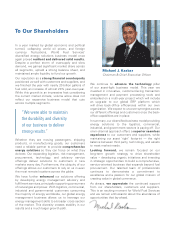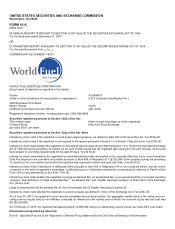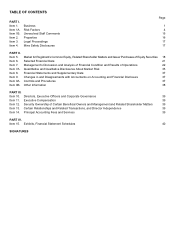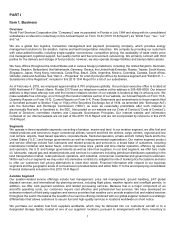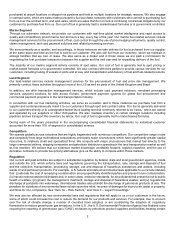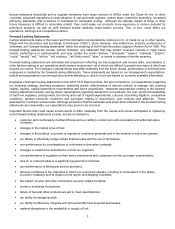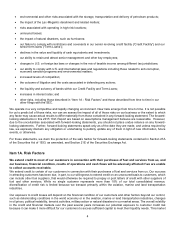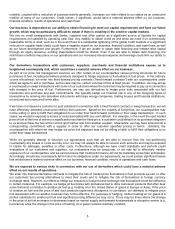World Fuel Services 2015 Annual Report Download - page 9
Download and view the complete annual report
Please find page 9 of the 2015 World Fuel Services annual report below. You can navigate through the pages in the report by either clicking on the pages listed below, or by using the keyword search tool below to find specific information within the annual report.4
• environmental and other risks associated with the storage, transportation and delivery of petroleum products;
• the impact of the Lac-Mégantic derailment and related matters;
• risks associated with operating in high risk locations;
• uninsured losses;
• the impact of natural disasters, such as hurricanes;
• our failure to comply with restrictions and covenants in our senior revolving credit facility (“Credit Facility”) and our
senior term loans (“Term Loans”);
• declines in the value and liquidity of cash equivalents and investments;
• our ability to retain and attract senior management and other key employees;
• changes in U.S. or foreign tax laws or changes in the mix of taxable income among different tax jurisdictions;
• our ability to comply with U.S. and international laws and regulations including those related to anti-corruption,
economic sanction programs and environmental matters;
• increased levels of competition;
• the outcome of litigation and the costs associated in defending any actions;
• the liquidity and solvency of banks within our Credit Facility and Term Loans;
• increases in interest rates; and
• other risks, including those described in “Item 1A - Risk Factors” and those described from time to time in our
other filings with the SEC.
We operate in a very competitive and rapidly changing environment. New risks emerge from time to time. It is not possible
for us to predict all of those risks, nor can we assess the impact of all of those risks on our business or the extent to which
any factor may cause actual results to differ materially from those contained in any forward-looking statement. The forward-
looking statements in this 2015 10-K Report are based on assumptions management believes are reasonable. However,
due to the uncertainties associated with forward-looking statements, you should not place undue reliance on any forward-
looking statements. Further, forward-looking statements speak only as of the date they are made, and unless required by
law, we expressly disclaim any obligation or undertaking to publicly update any of them in light of new information, future
events, or otherwise.
For these statements, we claim the protection of the safe harbor for forward-looking statements contained in Section 27A
of the Securities Act of 1933, as amended, and Section 21E of the Securities Exchange Act.
Item 1A. Risk Factors
We extend credit to most of our customers in connection with their purchases of fuel and services from us, and
our business, financial condition, results of operations and cash flows will be adversely affected if we are unable
to collect accounts receivable.
We extend credit to certain of our customers in connection with their purchases of fuel and services from us. Our success
in attracting customers has been due, in part, to our willingness to extend credit on an unsecured basis to customers, which
can include other fuel suppliers, that would otherwise be required to prepay or post letters of credit with other suppliers of
fuel and other services. While no single customer represents more than 10% of our total consolidated revenue,
diversification of credit risk is limited because we transact primarily within the aviation, marine and land transportation
industries.
Our exposure to credit losses will depend on the financial condition of our customers and other factors beyond our control,
such as deteriorating conditions in the world economy or in the aviation, marine or land transportation industries, changes
in oil prices, political instability, terrorist activities, military action or natural disasters in our market areas. The overall volatility
in the credit and financial markets over the past several years increases our potential exposure to customer credit risk
because it can make it more difficult for our customers to access sufficient capital to meet their liquidity needs. This market



